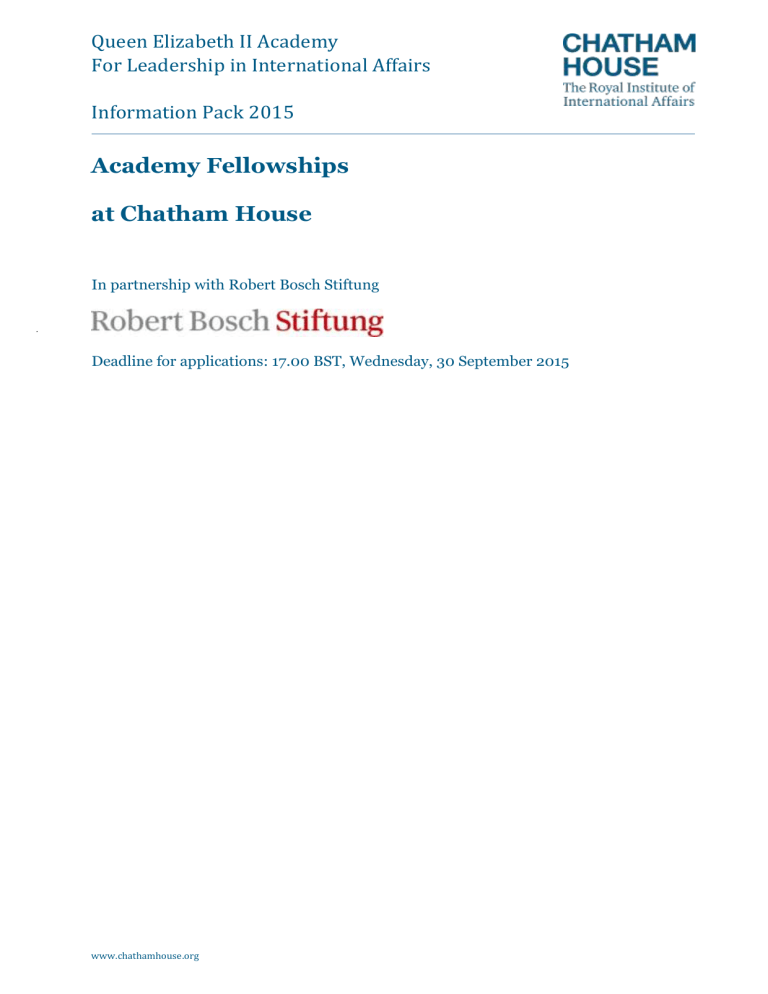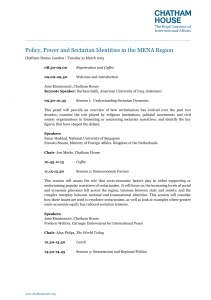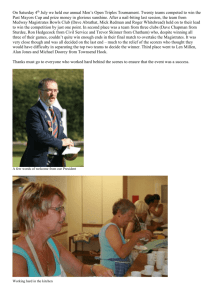Academy Fellowships

Queen Elizabeth II Academy
For Leadership in International Affairs
Information Pack 2015
Academy Fellowships at Chatham House
In partnership with Robert Bosch Stiftung
Deadline for applications: 17.00 BST, Wednesday, 30 September 2015 www.chathamhouse.org
2
Contents
Overview ..................................................................................................................... 3
Chatham House .......................................................................................................... 4
Robert Bosch Stiftung ................................................................................................ 5
Queen Elizabeth II Academy for Leadership in International Affairs ...................... 6
Academy Fellowships ................................................................................................. 7
Research Proposal and Topics ................................................................................... 9
Beyond the Fellowships.............................................................................................. 10
Remuneration, Visas and Conditions ........................................................................ 11
Selection Process ........................................................................................................ 12
How to Apply .............................................................................................................. 13
Contact Details ........................................................................................................... 14
3
Overview
Chatham House is pleased to invite applicants for fellowships in the Queen Elizabeth
II Academy for Leadership in International Affairs at Chatham House, a joint initiative of Chatham House and the Robert Bosch Stiftung.
The purpose of the Academy fellowship is to provide the next generation of scholars and young leaders who are citizens of Armenia, Azerbaijan, Belarus, Georgia,
Moldova, Russia and Ukraine with the opportunity to conduct their own research project, speak at events, expand his or her personal networks, and further develop an understanding of critical issues in international affairs, as a fellow of the
Queen Elizabeth II Academy.
Candidates should be emerging experts or practitioners in government, the private sector, civil society, academia, media, or the broader policy community.
The fellows will have the opportunity to focus in depth on a personal project in one of seven key research areas (see ‘Research Proposals and Topics’ on page 9 for more details) that should result in a Chatham House publication.
Chatham House will provide a dynamic base within which the fellows can pursue their own research interests; further develop their personal interaction, communication, and leadership skills; extend their global networks; and deepen their expertise by participating in the institute’s research and activities. This experience will inform the fellows’ contributions to improved regional and national decisionmaking on issues of current and future relevance.
In addition to their research project, fellows will participate in a comprehensive ninemonth programme of activities. They will spend approximately 30 per cent of their fellowship participating and contributing to the Academy’s leadership training programme, and approximately 20 per cent of their fellowship contributing to work within their research programme or department. It is expected that the senior fellow will participate in debates on his or her areas of expertise, while gaining a broader understanding of the challenges and opportunities of a competitive yet interdependent world.
Two Academy Robert Bosch Fellowships are available for 2016/17 as part of the Queen Elizabeth II Academy for Leadership in International
Affairs at Chatham House (see page 6 for more information). The fellows will be hosted by and based in the Russia and Eurasia Programme.
The application window for the 2016/17 fellowship will be open from
1 August 2015 to 30 September 2015. Applicants can chose to begin the fellowship in either February 2016 or September 2016.
The deadline for applications is 17.00 BST, Wednesday, 30 September
2015.
4
Chatham House
Chatham House, also known as the Royal Institute of International Affairs, was founded in 1920. The institute’s mission is to be a world-leading source of independent analysis, informed debate and influential ideas on how to build a prosperous and secure world for all. It consistently ranks highly in the University of
Pennsylvania’s annual Global Go To Think Tank Index, where it has been assessed by its peers as the No. 1 think tank outside the US for eight consecutive years and No. 2 worldwide for the past five years.
The institute undertakes independent and rigorous analysis with the aim of setting the agenda and shaping policy by encouraging new ideas and forward thinking in international affairs. Chatham House research is structured around four departments:
Area Studies and International Law; Energy, Environment and Resources;
International Economics; and International Security.
The institute holds over 300 events per year, including major conferences, workshops, seminars and briefings. Many of these events take place under the Chatham House
Rule, to allow expert discussion among policy stakeholders. Chatham House experts also offer special briefings in the UK parliament, and give evidence to government officials and legislators in capitals and metropolises around the world, including
Beijing, Brussels, Delhi, Istanbul, London and Washington, DC.
Many Chatham House projects culminate in publications, including reports, briefings and journal articles. International Affairs is Chatham House’s scholarly journal and the institute also publishes a bi-monthly magazine, The World Today. The Chatham
House website, which offers access to all the institute’s reports, papers and event transcripts, received 1.6 million individual visits last year, while the institute’s media profile is the highest of all UK-based policy institutes, with over 2,000 mentions, interviews and features in major national and international news outlets during
2014─15.
For more information, please visit: www.chathamhouse.org
.
5
Robert Bosch Stiftung
The Robert Bosch Stiftung is one of the major German foundations associated with a private company and has managed the philanthropic bequest of company founder
Robert Bosch for 50 years. Indeed it was his entrepreneurial vision, political farsightedness, moral fortitude and charitable initiatives that set the standards for the work of the Robert Bosch Stiftung.
The Robert Bosch Stiftung invests approximately 70 million euros annually in supporting approximately 800 of its own as well as third-party projects in the fields of international relations, education, society and culture, as well as health and science.
Since its founding back in 1964, the foundation has used more than 1.2 billion euros for charitable activities.
The Robert Bosch Stiftung continues the charitable pursuits of Robert Bosch (1861-
1942), the founder of both the company and the foundation. It owns a stake of around
92 per cent in the Robert Bosch GmbH, and finances its operations from the dividends it receives from this holding. Robert Bosch’s former home in Stuttgart serves as the foundation’s headquarters. Around 140 employees work for the foundation at this location and at its offices in Berlin.
The Academy Robert Bosch Fellowships at Chatham House are part of the programme area International Relations Europe and its Neighbours – Civic Society and Good
Governance. In order to develop and maintain a lively civil society, the foundation supports citizens, who actively assume responsibility for the common good. In addition, the foundation encourages governments to create the conditions and climate necessary for an active citizenry, following the principles of ‘Good Governance’. The foundation wants to particularly appeal to young people and support their creative ideas when it comes to getting citizens to be actively involved. This role can be directly traced back to Robert Bosch's own wishes and initiatives.
For more information please visit: www.bosch-stiftung.de
6
Queen Elizabeth II Academy for Leadership in International Affairs
at Chatham House
Chatham House launched the Queen Elizabeth II Academy for Leadership in
International Affairs in 2014. The Academy offers potential and established leaders from around the world the opportunity to spend up to 12 months as Academy fellows or senior fellows at Chatham House. Fellows of the Academy will develop their thinking on the most pressing national and international challenges facing their countries and regions and work together to craft credible, innovative responses.
Based in the unique and neutral venue of Chatham House, the Academy will build on the institute’s international reputation for independent thinking, cutting-edge research and informed debate. And it will take advantage of Chatham House’s location in the heart of London, one of the world’s most vibrant and global cities.
Nurturing a new generation of leaders
Established in 1920, the institute is approaching its centenary at a critical juncture in international affairs. The balance of economic and political power is shifting between the world’s established and emerging powers. There are deepening levels of competition and continued threats to international prosperity and security. At the same time, government and societies are seeking to take advantage of globalization and technological advances while managing their increasing levels of interdependence.
There is an urgent need to help current and future generations to understand the nature of these challenges and opportunities, the scope for national and institutional responses, and the differing approaches that individual governments and societies bring to them. Informed and enlightened statecraft and leadership will be essential in order to develop the national and international cooperation necessary to make progress in an interdependent but competitive world.
Fellows of the Queen Elizabeth II Academy will undertake a personal research project, under the guidance of a Chatham House expert; receive mentoring and coaching as part of a unique leadership programme; and participate in the activities of one of the institute’s research departments. Through their time with the institute, fellows will also bring fresh, diverse voices from around the world into the institute’s research and convening.
Fellows will be drawn from government and the broader policy community, the private sector and civil society. Over time, the Academy alumni will constitute an expanding cadre of decision-makers capable of working together to find solutions to complex policy problems and seize opportunities for future international cooperation.
For more information, please visit: www.chathamhouse.org/academy
7
Academy Fellowships
Purpose
The Academy fellowships, supported by the Robert Bosch Stiftung, will provide an opportunity for emerging leaders to publish, speak at events, expand their personal networks, and further develop an understanding of critical issues in international affairs, which will enable them to contribute to positive change in their home countries and broader region.
Candidate background
Academy fellowship candidates will be at an early to middle stage of their career with a background in international relations, social science or economics, whether they come from academia, NGOs, business, government or the media. They should possess knowledge of, and an interest in, one of the policy-related challenges laid out in the research topics on page 9.
Expected outputs and activities
Academy fellows will spend approximately 50 per cent of their time working on a personal research project. They will have the opportunity to conduct research from
Chatham House, including consultations with experts within the institute’s extensive network. They will also be able to travel to undertake field research and interviews, if this is a necessary aspect of the research project.
The project will be supervised by a senior Chatham House researcher through regular face-to-face contact. Fellows will also be supported in basic administrative or logistical tasks, such as travel arrangements for external meetings or organizing workshops at
Chatham House.
It is a requirement that the output from the research project will result in a formal
Chatham House publication. Chatham House will provide full support for dissemination and promotion of the publication.
Academy fellows will also take part in a significant programme of personal development, including: a) Contributing to the activities of their host programme or department, accounting for approximately 20 per cent of their time and including regular attendance at Chatham House lectures, seminars and workshops; b) One-to-one mentoring including advice on the fellow’s personal research project and on career development; c) The Academy leadership training programme, accounting for approximately
30 per cent of a fellow’s time, covering group tasks, such as training in research methods, media skills, project management, presentations, and networking opportunities.
Depending on fellows’ past experience and areas of expertise, they will also be able to observe and participate in the wider activities of Chatham House. It is intended that the fellowships will provide a platform upon which participants will work to strengthen their area of expertise.
8
Funds will also be available for the fellow to conduct a research trip to the region associated with the project.
Timeline
Academy fellowships will begin in either February 2016 and conclude in November
2016 or begin in September 2016 and conclude in June 2017.
Candidates must be available to be based at Chatham House in London for the full
9-month duration of the fellowship.
Eligibility criteria
To be eligible for an Academy fellowship, candidates must:
Be a citizen of Armenia, Azerbaijan, Belarus, Georgia, Moldova,
Russia or Ukraine;
Have a background in international relations, social science or economics;
Have a track record of research into the politics, economies and/or societies of
Russia, Eastern Europe and/or the South Caucasus or European policy in this region;
Have a clearly defined area of research or policy interest which fits within one of the broad research themes outlined on page 9;
Have excellent English writing and presentation skills.
9
Research Proposal and Topics
Applicants’ research proposals should outline the topic to be investigated, the likely methodology, the project’s importance and its policy relevance. Proposals should also describe any necessary fieldwork and provide a timeline of activities, to indicate how the proposed work would be completed during the fellowship. Academy fellows will sit within Chatham House’s Russia and Eurasia Programme.
There are seven possible research topics for the 2016/17 Academy Robert Bosch
Fellowships and applicants must indicate their chosen research topic on the application form.
The parameters for the research topics have been designed in broad terms to allow applicants to devise a project that appeals to their own research interests. Applicants may propose a research project that fits within any of the seven topics outlined below.
Internal dynamics
Prospects for economic growth, modernisation and democratization in the
Eastern Partnership countries and/or Russia;
Regional elites and networks of power;
Societal changes, inter-ethnic relations and non-state actors.
External attitudes
The future of EU and NATO relations with the Eastern Partnership countries and/or Russia;
Security and conflict resolution;
Prospects for intra-regional cooperation;
Russia and the shared neighbourhood with Europe.
10
Beyond the Fellowships
Chatham House will maintain close contact with fellows after the completion of their fellowship. It is hoped that the fellow will develop his or her career in a related field and contribute to the understanding and practice of international affairs in years to come. In addition, it is hoped that fellows will continue to remain involved with the institute. Finally, it is hoped that the fellow will engage in strengthening mutual understanding across borders.
Academy Associate status
On completion of the fellowship, Chatham House may offer the opportunity for all
Academy fellows and Academy senior fellows to hold Academy associate status, in order to provide an affiliation with Chatham House and to reflect their ongoing connection and contributions to the institute. However, such status will only be given to fellows who have performed to a high level and satisfactorily completed the full range of requirements of the fellowships during their time at Chatham House.
The Academy associate status will last for up to two years after the completion of a fellowship and will become active upon the publication of their research. This status will provide individuals with recognition of their contribution to the work of Chatham
House and the opportunity to participate in the institute’s research and other activities.
Chatham House individual membership
Each fellow will receive complimentary individual membership of Chatham House for five years following the completion of the fellowship. For more details of the benefits of Chatham House membership, please visit: www.chathamhouse.org/become-member/individual-membership
11
Remuneration, Visas and Conditions
Remuneration and accommodation
Chatham House will provide a monthly stipend in pound sterling (GBP) to the value of approximately €3,000 for Academy fellows for the duration of the fellowship (this is intended to cover costs such as accommodation, food, travel in London etc.).
To assist fellows in relocating from their home country to London for the term of the fellowship, the institute will cover one return trip to the UK and accommodation in a hotel on arrival (if required). The institute will also provide a small budget for fieldwork and research-related travel during the fellowship.
Chatham House will provide assistance but fellows will be responsible for securing accommodation, health insurance, and making the necessary banking arrangements.
Visa details
Chatham House will issue a certificate of sponsorship for successful candidates to apply for a Temporary Worker visa under Tier 5 of the UK points-based system. This visa category:
Does not include sponsorship of any dependants (spouses, children or other family members);
Does not permit fellows to stay in the UK beyond the duration of their fellowship;
Does not permit fellows access to public funds while in the UK;
Does not permit fellows to undertake employment in the UK in addition to this fellowship.
The fellowships will be awarded regardless of candidates’ existing financial circumstances. Candidates will not be required to show a level of savings or bank statements when applying for their visa. Chatham House will where necessary confirm to the UK Border Agency that fellows will have sufficient maintenance for the duration of the fellowship.
Chatham House will provide successful candidates with support and guidance during the visa application process.
Conditions of the fellowships
Successful applicants will be asked to sign a fellowship agreement before the fellowship begins, which will outline the terms and conditions of the fellowship, and any procedures for early conclusion of the fellowship.
Participation in the Academy fellowship will not lead to an offer of any kind of employment at Chatham House.
12
Selection Process
Two fellowships will be awarded in 2016/17.
Applications will be assessed according to the following criteria:
Nationality eligibility requirements;
The relevance and clarity of the proposed research project, as demonstrated through the project proposal;
Relevant background experience, as demonstrated through the
curriculum vitae;
Sufficient English-language ability, as demonstrated through submitted
writing samples; and
Motivation for undertaking the fellowship and for contributing to the candidate’s home country or region, as demonstrated through the post-
fellowship plan.
Following a review of applications, shortlisted candidates will be invited to an interview at Chatham House. If necessary, Chatham House will provide an invitation letter for visa application purposes. The interview committee will be drawn from
Chatham House senior management and the Robert Bosch Stiftung.
Interviews will take place in mid-November 2014 and candidates will be informed of the outcome within a week of the interviews.
The decision of the interview committee is final and no appeals will be permitted. All candidates will be informed of the outcome of their applications by email.
13
How to Apply
Candidates must do the following:
1.
Download and complete the application form (available on the Chatham
House website);
2.
Email the application form, together with one published writing sample in
English (or an English translation of their own work originally published in another language) to:
AcademyRobertBoschFellowships@chathamhouse.org
.
The research proposal should outline the topic to be investigated and the likely methodology, and must explain the project’s importance and policy relevance. It should also describe any necessary fieldwork, provide a timeline of activities, and indicate how the proposed work would be completed during the fellowship.
The post-fellowship plan should outline why the fellowship will be useful to your career goals and how you will draw on the experience to strengthen civil society in your region and/or to advance your professional field in your region.
All files should be sent in PDF format to
AcademyRobertBoschFellowships@chathamhouse.org
.
All documents must be submitted in English.
The application deadline is 17:00 BST, Wednesday, 30 September 2015.
Incomplete or late applications, and applications which do not adhere to the criteria outlined above, will not be considered.
14
Contact Details
For more information on the Queen Elizabeth II Academy and current fellowship opportunities, and to refer to a series of Frequently Asked Questions , please go to the
Academy website: www.chathamhouse.org/academy/fellowships
Should you have any further questions, please contact the Academy team:
Queen Elizabeth II Academy for Leadership in International Affairs
Chatham House
10 St James’s Square
London
SW1Y 4LE
United Kingdom
Tel: +44 (0)20 7389 3272
Fax: +44 (0) 20 7957 5710
Email: AcademyRobertBoschFellowships@chathamhouse.org
For more information on Chatham House, please visit www.chathamhouse.org








